Tired of waiting for Congress to fix No Child Left Behind, Oregon passed its own package of laws similar to NCLB last month that include their own, customized approaches to accountability systems. Why? According to current NCLB measurements, four out of five schools nationwide could be labeled as failures, and could possibly lose all federal funding. So, state lawmakers in several states including Indiana and Tennessee are improving these scales by developing their own systems that will take into account things besides test scores such as students’ individual progress, graduation rates, and enrollment in AP courses. It doesn’t mean these states are opting out of NCLB, but state funding to public schools is significant–it accounted for half in California last year–and can be attached to its own accountability measures.
Most teachers at San Francisco’s Mission High want to see a similar approach, although they’d like to see more weight attached to other measures such as grades; attendance, suspension, and dropout rates; student, parent and teacher satisfaction surveys; and how many Latino and African-American students enroll in Honors and APs.
Tennessee school superintendant Tony Bennett tells the New York Times that he wants to see even schools where the majority of students are performing well to focus on raising the achievement among the bottom 25 percent of students. Right now, there are no incentives to do that. Lillian Lowery, Delaware’s secretary of education, also says she wants to see more local control over the use of federal funding.
Incidentally, Oregon came up with its own solution to the “debt crisis” too. Rather than completely gut school funding and other essential government services like most states, Oregonians voted to raise taxes on the highest-income residents and corporations earlier this year.















